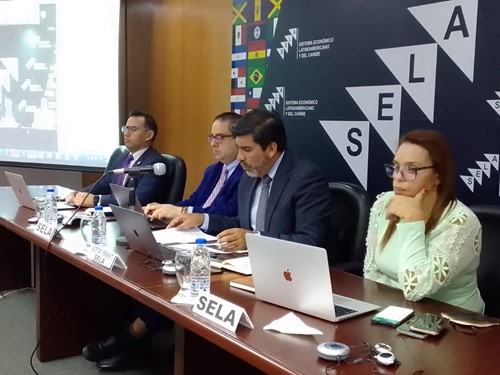
The Latin American and Caribbean Economic System (SELA) presented to the organisation’s Caribbean Member States the progress made in its multi-year Work Programme to strengthen ties and coordinate actions in favour of regional integration.
The Permanent Secretariat of SELA made a presentation on the growth of the Network of Digital and Collaborative Ports; the projects for SMEs and the identification of productive niches; as well as the progress made in diagnosing the vulnerability of food systems in the region and the initiatives to address it.
“An action committee has been established to guide the institutionalisation, and we are in the process of obtaining resources through CAF-development bank of Latin America so that the network can have a better impact. The Network already includes 13 countries and 28 port systems, but the idea is to expand the participation of all countries,” the Permanent Secretary of SELA, Ambassador Clarems Endara, said in relation to the growth of the Network of Digital and Collaborative Ports.
The Permanent Secretariat explained the scope of the promotion, assistance and strengthening of the export business ecosystem in the region through support to SMEs and the identification of productive niches that favour development and boost sustainable growth in the region. SELA has developed its own methodology for the identification of potential productive niches in its member countries, in order to generate public policies for the development of productive linkages associated with goods and services of greater economic complexity.
Finally, Ambassador Clarems Endara detailed the progress of the diagnosis of food vulnerability in Caribbean countries. “We have worked very closely with CELAC (the Community of Latin American and Caribbean States) to urgently address the food situation. We require a broad cooperation, because the survey of this diagnosis requires accurate data in order to identify the needs and make cooperation more efficient, which guarantees the implementation of stable and sustainable programmes,” the Permanent Secretary said.
